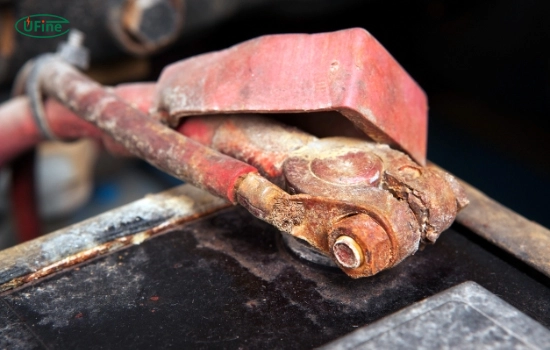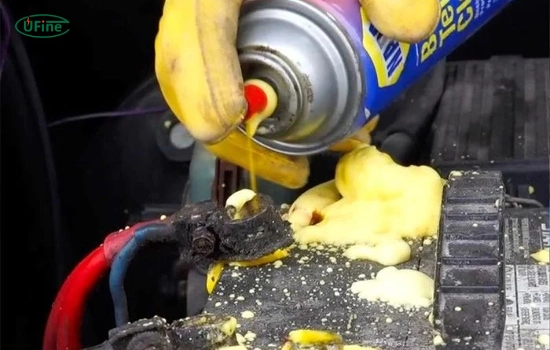
- Part 1. What is battery rust?
- Part 2. Why do batteries rust?
- Part 3. How lithium batteries resist rust?
- Part 4. Signs your battery is rusting
- Part 5. How to clean rust from battery terminals safely?
- Part 6. How to prevent battery rust at home?
- Part 7. How to prevent battery rust in industrial environments?
- Part 8. Battery types and their rust risks
- Part 9. Myths about battery rust
- Part 10. FAQs about battery rust
Battery rust is a common problem that affects both household and industrial batteries. It causes poor performance, shortens battery life, and in some cases, can pose safety risks. If you’ve ever asked, “Why do batteries rust?”, the answer lies in a mix of moisture, chemical reactions, and poor maintenance. In this guide, we’ll explore the reasons behind battery rust, how to spot it early, and most importantly, how to prevent battery rust effectively in both home and industrial settings.
Part 1. What is battery rust?
Battery rust refers to the corrosion that forms on battery terminals and connectors over time. This usually appears as a white, green, or bluish powdery substance. Rust is a sign that a chemical reaction is occurring, typically between the metal on the terminals and an outside element such as moisture or leaked electrolyte fluid.
While the term “rust” technically refers to iron oxide, in the battery world, it’s more about corrosion and oxidation of metals like copper, lead, or zinc. When these metals react with acid or water, they form corrosive compounds that interfere with electrical conductivity.
Part 2. Why do batteries rust?
There are several common causes of battery rust. Understanding these can help you stop the problem before it starts.
1. Moisture in the environment
Humidity is one of the main reasons batteries start to rust. When water vapor in the air condenses on the battery’s terminals, it creates the perfect conditions for oxidation. This is especially common in garages, sheds, and industrial sites with poor ventilation.
Quick tip: Always store batteries in a dry, cool place to reduce moisture exposure.
2. Electrolyte leakage
Battery acid, or electrolyte, is a corrosive substance inside the battery. If the battery case is damaged or old, it may leak. This acidic fluid reacts with the terminal metals and causes corrosion.
This is often seen in alkaline batteries, where potassium hydroxide leaks out and forms a white crust on the terminals.
3. Metal oxidation
Even without leaks or high humidity, oxidation naturally occurs over time. When metals like copper and lead are exposed to oxygen (especially in the presence of moisture), they oxidize. This is a slow process but inevitable without proper protection.
4. Overcharging or undercharging
Improper charging also plays a role. Overcharging generates heat, which can cause the electrolyte to expand and leak. On the other hand, undercharging leads to sulfation, which can also result in corroded terminals. This is a common issue with lead-acid batteries.
Part 3. How lithium batteries resist rust?
Lithium batteries are often seen as more advanced and reliable. One of their biggest advantages is resistance to rust. Here’s why:
- Sealed design
Most lithium batteries are completely sealed. That means there’s no chance for electrolyte to leak out. No leaks mean no acid to cause corrosion on the terminals. - Solid-state components
Some newer lithium batteries use solid-state electrolytes instead of liquid ones. These materials are chemically stable and do not contribute to corrosion. - Better casing materials
Lithium batteries are often made with corrosion-resistant metals or plastic casings that protect internal parts from environmental exposure. - Smart battery management systems (BMS)
These systems monitor temperature, voltage, and charging levels. They prevent overcharging and overheating, which are major causes of rust in traditional batteries.
Artikel Terkait: Why Lithium Batteries Don’t Rust
Part 4. Signs your battery is rusting
It’s important to catch corrosion early. Here are the most common signs that your battery is rusting:
- White or blue powder around the terminals
- Rusty or discolored terminals
- A foul or metallic smell
- Poor electrical performance
- Difficulty starting a device or engine
If you notice any of these, it’s time to clean the terminals and inspect the battery.
Part 5. How to clean rust from battery terminals safely?
Cleaning battery rust is simple, but it must be done carefully.
What you need:
- Gloves and safety goggles
- Baking soda and water
- A toothbrush or wire brush
- Clean cloth
- Petroleum jelly (optional)
Steps:
Turn off and disconnect the battery
Mix baking soda and water into a paste
Apply the paste to the corroded areas
Scrub gently with a toothbrush or wire brush
Wipe clean with a cloth
Apply petroleum jelly to the terminals to prevent future rust
Important: Never use metal tools that could spark near a battery.
Part 6. How to prevent battery rust at home?
Preventing rust is easier than dealing with it later. Here are some simple home tips to stop corrosion before it starts.
- Keep batteries dry
Store them in a moisture-free place. Avoid basements, bathrooms, or any place with high humidity. - Use anti-corrosion washers
These are small felt rings soaked in anti-corrosion chemicals. Place them around the terminals to trap moisture and stop rust. - Check for leaks regularly
Inspect batteries every few months for swelling, cracks, or fluid. If you spot any, dispose of the battery safely. - Apply protective coatings
You can use petroleum jelly or dielectric grease on terminals to block oxygen and moisture.
Part 7. How to prevent battery rust in industrial environments?
In factories, power plants, or large facilities, batteries face harsher conditions. Here’s how to protect them:
- Install climate controls
Use dehumidifiers, air conditioners, or sealed rooms to keep humidity low around critical battery banks. - Use smart chargers
Always use chargers with automatic shutoff or BMS integration. This helps avoid overcharging and overheating. - Regular maintenance schedules
Set up a monthly battery inspection plan. Check voltage, temperature, and signs of corrosion. - Use industrial-grade lithium batteries
These batteries are built with corrosion-resistant materials and are less likely to rust even in tough environments. - Label and rotate stock
For facilities that store many batteries, always use the oldest batteries first and keep records of age and condition.
Part 8. Battery types and their rust risks
Understanding which batteries are more prone to rust can help you make better choices.
| Battery Type | Rust Risk Level | Notes |
|---|---|---|
| Alkaline | High | Common in homes; often leak when old |
| Lead-acid | Very High | Frequent in cars; prone to terminal corrosion |
| Nickel-cadmium | Moderate | Better sealed, but not rust-proof |
| Lithium-ion | Low | Sealed and stable, less risk of rust |
| Solid-state | Very Low | Advanced tech; highly resistant |
Part 9. Myths about battery rust
There’s a lot of misinformation out there. Let’s break down some common myths.
- Myth 1: Only old batteries rust
Truth: Even new batteries can corrode if stored in poor conditions or charged improperly. - Myth 2: Rust is only cosmetic
Truth: Rust can block electrical flow and even cause fires in extreme cases. - Myth 3: You can’t prevent rust
Truth: With proper care and storage, battery rust is 100% preventable.
Part 10. FAQs about battery rust
Why do batteries rust so quickly in humid areas?
Batteries rust faster in humid climates because moisture speeds up oxidation. This leads to quicker corrosion of exposed metal parts.
Can I still use a battery with rust on it?
Yes, but only after cleaning the rust. If the battery is leaking or damaged, it’s safer to replace it.
What’s the white stuff on the battery terminals?
That’s usually a mixture of potassium carbonate or other corrosion byproducts. It forms when electrolytes leak or metals oxidize.
Are car batteries more prone to rust?
Yes. Car batteries are lead-acid types, which are highly susceptible to terminal corrosion, especially in cold or wet climates.
Do lithium batteries rust at all?
Rarely. Lithium batteries are sealed and designed to resist moisture and leaks. However, if damaged, even they can corrode.
Related Tags:
More Articles

Battery Load Test: A Comprehensive Guide
Step-by-step battery load test guide for car, solar & industrial use. Learn how to load test a battery, interpret voltage charts, and avoid common mistakes.
The Comprehensive Guide to Battery Balancing and Battery Balancer
Discover how battery balancers improve lithium battery performance, lifespan, and safety. Learn types, functions, and tips to choose the right balancer.
What Is the Best Voltage for a Chainsaw Battery?
Compare 12V-80V chainsaw batteries for light pruning, medium firewood, and professional cutting. See best battery chainsaw with runtime charts and safety tips.
Lithium VS. Alkaline Batteries: A Comprehensive Comparison
Lithium batteries last 3–7× longer than alkaline and perform better in cold weather. Compare lifespan, cost, safety, and best uses to choose the right battery.
Comparing Lithium-Sulfur and Lithium-Ion Batteries: Which is Right for You?
Compare lithium-sulfur (Li-S) and lithium-ion batteries on energy, lifespan, cost, safety, and applications. Best choice for drones, EVs, and electronics.




